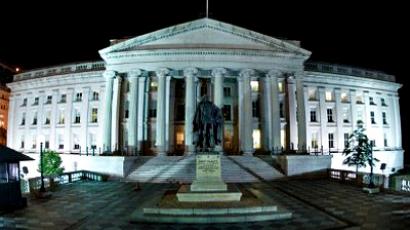US choosing between world supremacy and feeding its citizens
With the US plunging deeper into choppy financial waters, more voices are joining the call to review the nation’s priorities. They say having an army which can conquer almost any imaginable enemy is of little value when people at home are hungry.
The late comedian George Carlin always spoke frankly about his nation. In one of his shows he said:“The only true lasting American value that’s left: buying things. Buying things. People spending money they don’t have, on things they don’t need.”Today, the country long driven by borrowing and consuming desperately needs to cut its spending. US defense and security spending has remained untouchable, soaking up US$705 billion – or 20 percent of federal funds – every year. Since 2001, more than $1.2 trillion has been spent on wars in Iraq and Afghanistan.But now, with a $14.4 trillion-deep hole, some economists say it is time for the US to compromise and swap world domination for domestic stability.“We’ll also have to see a significant questioning in downsizing of the several hundred foreign military bases we have. Given the size of the budget problems and the growing issues of the national debt and the debt ceiling it is fairly well assured that the budget will be cut for defense and it probably needs to be cut more than presently proposed,” believes Max Wolff, Professor of Economics at the New School University, New York.For the Pentagon, priorities may be different. The DoD reportedly spent $23 billion on RQ-4 Global Hawk drones alone.This year, tax-payers have spent an estimated $122 billion on the war in Afghanistan – the same amount could cover some 25 million low-income Americans with health care.“An empire costs a lot of money because you have to spend a lot of money to defend it. You have to spend a lot of money to promote it. You have to have a lot people working on various aspects of economic support for imperial adventures around the world. The consequence is the money is leaving the United States going to other places, not to the places in the United States that need it the most,” explains Danny Schechter, a New York-based economist and filmmaker.Needing it most is the country’s neglected infrastructure and the jobs that come with rebuilding. According to the American Society of Civil Engineers, a quarter of America’s 600,000 bridges are listed as deficient and nearly half of American households do not have access to public transport.Ongoing federal budget cuts are expected to force thousands of post offices, schools and fire departments to close. More than 40 million Americans on food stamps may also have to make sacrifices.“We just cut the food stamp budget by $12 billion. We have multiple, experimental ongoing programs in the defense department, each of which is large enough to offset the food stamp cuts. And I think if we already have 41 million people already, who are dependant on government aid for food, getting food to them is probably a first priority,” Max Wolff says.But Defense Secretary Leon Panetta is looking further afield for his priorities."We are a nation at war. We face a broad and growing range of security threats and challenges that our military must be prepared to confront, from terrorist networks to rogue nations that are making efforts to obtain a nuclear capability, to dealing with rising powers that always look at us to determine whether or not we will, in fact, maintain a strong defense here and throughout the world," he said.Eyes on the world, while citizens face mounting struggles at home. George Carlin would have something to say about that:“That’s what the owners count on. The fact that Americans will probably remain willfully ignorant of the big red, white and blue c**k that’s being jammed up their a*s every day. Because the owners of this country know the truth. It’s called the American dream. Cause you have to be asleep to believe it.”














